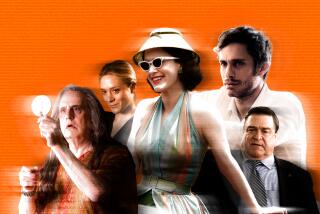Think of DVRs as TV heroes
- Share via
Are DVRs killing serialized shows? Or are producers just looking for scapegoats?
In case you haven’t heard, Tim Kring, executive producer of NBC’s onetime hit drama “Heroes,” got himself in hot water with recent comments about viewers and DVRs. Kring said DVRs were making it tougher for serialized shows like “Heroes.”
At a screenwriting conference earlier this month, Kring said of the serialized trend: “It’s a very flawed way of telling stories on network television right now, because of the advent of the DVR and online streaming. The engine that drove [serialization] was you had to be in front of the TV [when it aired]. Now you can watch it when you want, where you want, how you want to watch it, and almost all of those ways are superior to watching it on air. So [watching it] on air is related to the saps . . . who can’t figure out how to watch it in a superior way.”
The vast majority of the commentary prompted by Kring’s remarks centered, not surprisingly, on the nasty characterization (he used another term less pleasant than “saps”) of people who don’t have DVRs as saps! What a nasty guy! (Kring later apologized.)
But as for his larger point: Is it true? Are DVRs really hurting serialized shows? The networks have a lot riding on that answer, because 1) DVRs currently make up about 28% of the Nielsen Media Research sample and their use is growing, and 2) some of the hottest shows, including “Lost,” “24” and “Heroes,” have been heavily serialized. If DVRs are killing these types of shows, network TV could be in even bigger trouble than we thought.
But the evidence for Kring’s claim doesn’t look very strong. Nielsen stats for the week ending Nov. 2 show that “Heroes” was among the most-time-shifted shows on television, with nearly 40% of its total audience watching on a non-live basis. Only CW’s “90210” and NBC’s “The Office” got bigger bumps from DVR usage.
That DVRs could only help serialized series seems intuitive as well. The ability to record multiple programs enables viewers to manage time more effectively and juggle more competing programs than they otherwise could. They can avoid bailing on a complicated show just because they happened to miss an episode that, say, aired at an inconvenient time. And while there’s no question that DVR usage is artificially depressing “live + same day” ratings (i.e., numbers that include DVR viewing the same day a show airs), that should not matter over the long run, because the trend is affecting all shows at the same time, if not necessarily equally.
The DVR, looked at this way, is “Heroes’ ” friend, not its enemy. (Kring could not be reached for comment).
What’s ailing some serialized shows is probably not so much new technology as a glut of similar products elsewhere. There are now plenty of shows with an intricate “mythology,” as producers like to say. So if one of them disappoints you -- as many fans have grown cold on “Heroes” lately -- there’s another show for you to check out somewhere else.
No reason to be bored these days, in other words. Even if you’re a sap without a DVR.
--
More to Read
The complete guide to home viewing
Get Screen Gab for everything about the TV shows and streaming movies everyone’s talking about.
You may occasionally receive promotional content from the Los Angeles Times.







